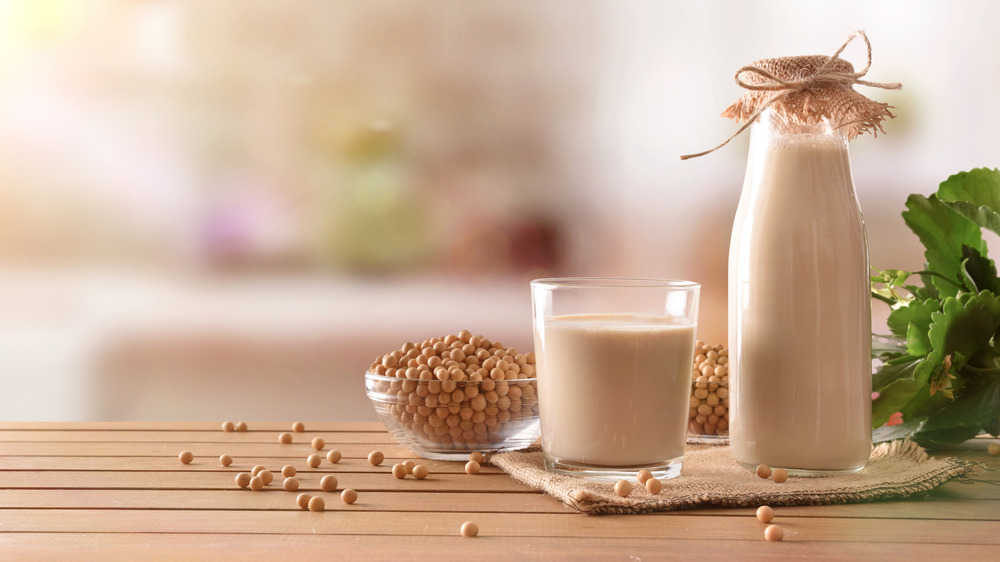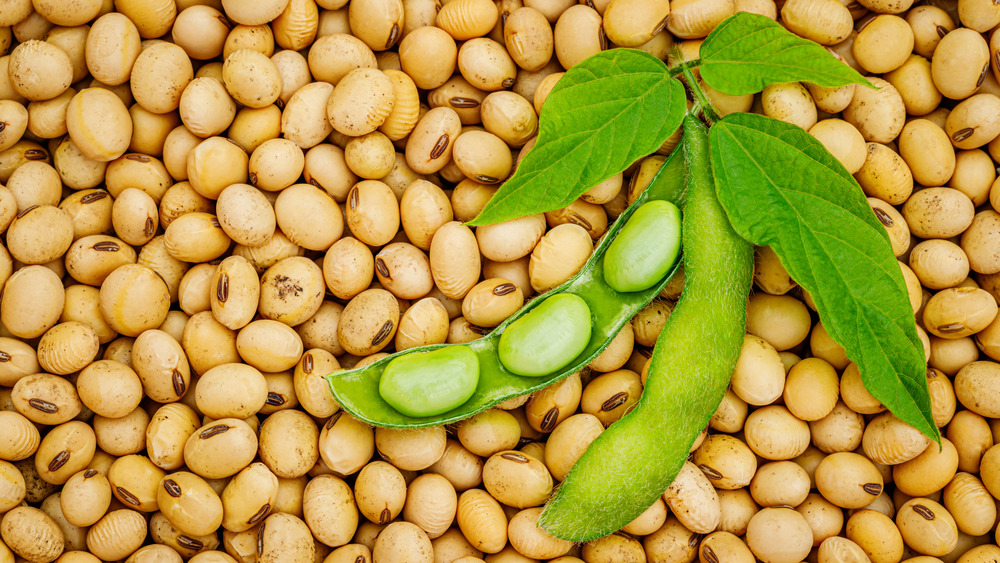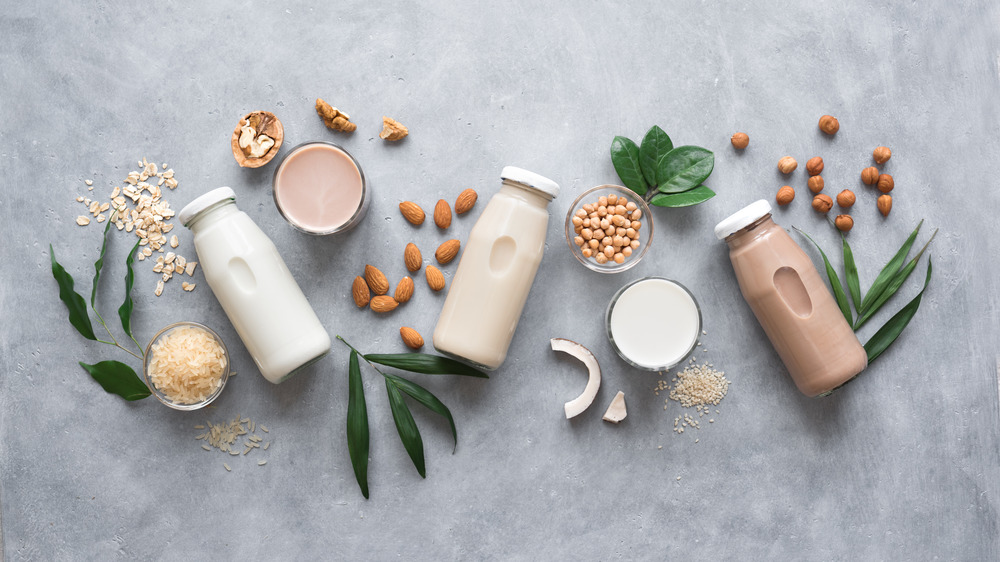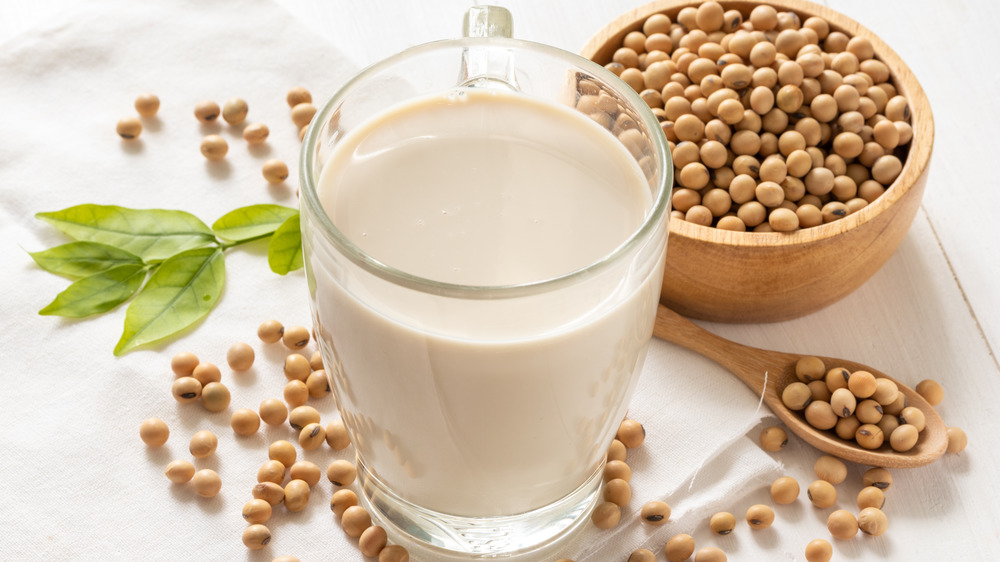This Most Nutritious Non-Dairy Milk Might Surprise You
Whether you're browsing for a nut alternative, like almond or cashew, or you're craving something a little different, like oat or hemp, you have a lot of dairy-free milk options to choose from. But before we get into which one is the most nutritious, let's talk about how dairy-free milk is made in the first place, because you obviously can't "milk" an almond, oat, or soybean.
The process of creating non-dairy milk depends on where it's sourced from, but most of the time, a similar method of blending the main ingredient with water then straining it is used (via Food Network). After, flavors, sweeteners, thickeners, stabilizers, and additional nutrients, like calcium and vitamin D, are sometimes added to enhance the milk's flavor and nutrient profile. That said, if you're trying to be health-conscious, the incredibly vast selection of non-dairy milks at the grocery store might feel overwhelming.
Truly, there's no one-size-fits-all of anything when it comes to nutrition, which is why it's important to talk to your healthcare provider to determine which alternative will suit your health needs the best. But in the meantime, let's discuss why this Journal of Food Science and Technology (JFST) study hails soy milk as being the healthiest non-dairy milk alternative you can buy.
Soy pretty much reigns over the world of non-dairy alternatives
JFST doesn't consider soy milk to be "the best alternative for replacing cow's milk in [the] human diet" without good reason. As far as nutritious value, soy pretty much reigns supreme when it comes to non-dairy alternatives. First of all, soybeans contain all of the essential amino acids necessary for human nutrition; in other words, it's a complete protein source, just like animal products are (via PubMed).
In fact, "Only soy milk is comparable in providing with same amount of proteins (8.71 grams) to the human body [as cow's milk]," according to JFST. In case that's not enough, soy's high levels of protein can help lower cholesterol, maintain bone density and decrease fractures in postmenopausal women, and might improve menopausal hot flashes. There's also speculation that soy's phytonutrients, or isoflavones, may reduce the risk of cancer, although according to Healthline, the evidence is mixed. In addition to all of that, soy also contains magnesium, fiber, potassium, and some B vitamins.
Soy milk compared to other non-dairy milks
We know that soy milk has a ton of protein, nutrients, and other health benefits, but what makes consuming soy milk so much better than other dairy-free milks? First, let's compare it to almond milk. Almond milk is super low in protein and carbs, which makes it less nutritionally balanced (via Time). And coconut milk? While it might be low in calories, it has no protein at all (although the drink has been tied to improving cholesterol levels).
Then, there's rice milk. It lacks beneficial nutrients and has 133 calories per serving. "Research suggests that 'consumption of rice milk as an alternative to cow's milk without proper care can result in malnutrition," according to Time. For those with a sweet tooth, rice milk might seem like a tasty alternative when compared to soy milk's "beany" flavor, but soy milk is definitely crowned as the winner of the most nutritious superlative.
Possible downsides of drinking soy milk
Alas, drinking soy milk does have a few downsides and a few myths surrounding it. Healthline explains that soy contains antinutrients called phytates, which can reduce the availability of iron and zinc in soy protein. Fortunately, if you maintain a well-balanced diet, phytates won't adversely affect your health. There's also some concern that the isoflavones in soy might interfere with hormone levels and thyroid function.
However, studies have shown that soy actually has no or a very mild effect on human thyroid function. Although it's important to take all matters into consideration, soy milk is still considered to be nutritionally superior to other dairy-free milk alternatives. As Healthline points out, "While there are some potential drawbacks to eating soy, the evidence is fairly weak and suggests that most people can consume soy with no issues." All things considered, for the most balanced diet, soy milk is probably your best bet — at least for now.



